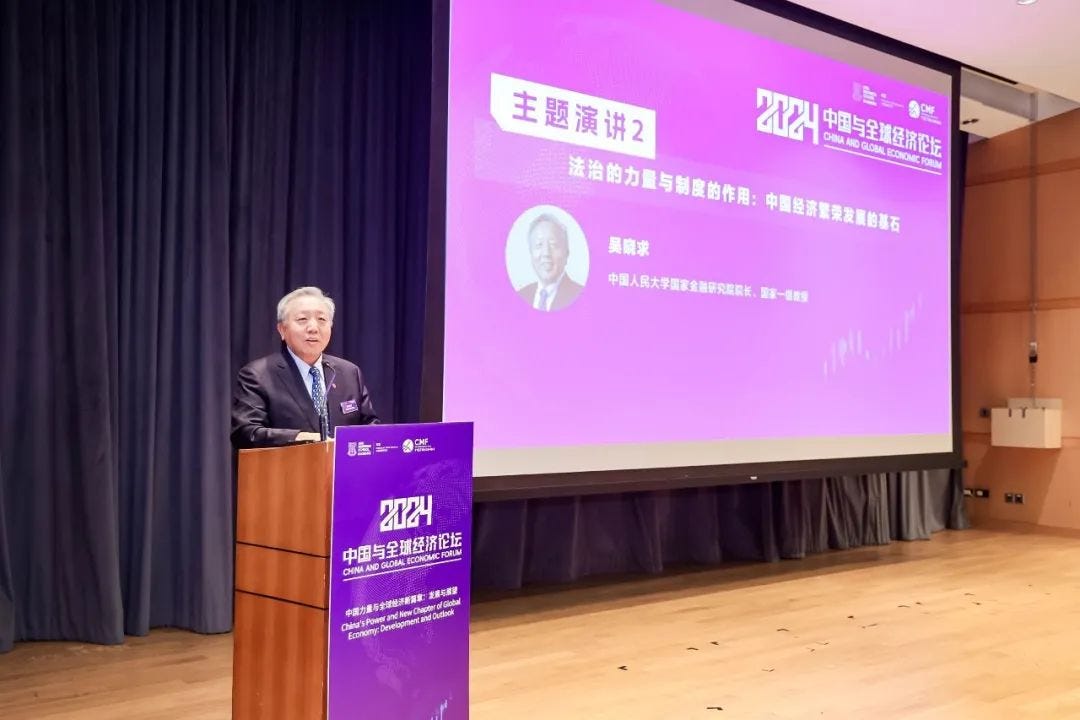Wu Xiaoqiu says rule of law, institutions are cornerstone of China's development
The senior economist believes frequent policy adjustments don't work and underlines the need for China to integrate with the international community.
Below is a translation of Wu Xiaoqiu’s speech at the 2024 China and Global Economic Forum on July 20 in Hong Kong, organized by the Institute of China Economy (ICE), University of Hong Kong Business School and China Macroeconomy Forum (CMF), Renmin University of China (RUC).
Wu is a former vice president of RUC and dean of the university's National Academy of Financial Research. The Chinese transcript is available via the WeChat blogs of the CMF and the Chongyang Institute, RUC. The emphasis is theirs.
In my earlier years, my research centered on economic operations including short-term economic analysis. Since then, I have been continuously pondering the foundation of China's sustained economic prosperity. Now, my focus is more on the power of the rule of law and the role of institutions.
Leveraging the Power of the Rule of Law to Boost Confidence and Stabilize Expectations
As it stands, I believe the key problem facing China's economy lies in confidence and expectations. China does not lack market mechanisms. Over the past 40-plus years since reform and opening up, China has learned how to leverage the role of the market. China doesn't lack international vision either. Since its accession to the WTO, China has gained a deep understanding of the rules of the global economy. China also doesn't lack perserverence; the Chinese people are among the most hardworking in the world. Nor does China lack wisdom—it has the capability to learn and adopt best practices. Additionally, China no longer lacks capital. More than 40 years ago, capital was scarce, and the country's limited foreign exchange reserves and household savings were insufficient to drive modernization. However, today, China has abundant capital and has even become a country with excess capital to some extent. Except for certain core technologies in key fields, China is also not lacking in most technologies.
Therefore, China boasts a strong factor endowment. According to statistics, China's GDP expanded by 5.3 percent year-on-year in the first quarter and 4.7 percent in the second quarter in 2024. Overall, China's GDP grew 5 percent yearly in the first half of 2024. While the average data appears satisfactory, the trend indicates concerns about China's economy. A growth rate of 5 percent is quite some achievement for a large economy with a GDP of over 126 trillion yuan [$17.51 trillion], compared with other major economies. However, there remains a gap between people's perceptions at the micro level and macroeconomic data.
Indeed, it is challenging to strike a balance between macroeconomic data and micro-level perceptions. I do not doubt the accuracy of the macroeconomic data, nor do I question the micro-level perceptions. The primary problem facing China's economy does not stem from factors of production but rather from confidence and expectations. Where does confidence originate? It comes from the rule of law. When people feel secure, and society has a fundamental baseline, confidence naturally follows.
I am delighted that the Third Plenary Session of the 20th Central Committee of the Communist Party of China (CPC) has specifically emphasized the rule of law, which touches on the essence of China's economic problems. Without a sound rule of law, it will be difficult for various factors of production to function effectively.
In reality, there are many instances of illegal activities in China that people encounter in their daily lives. For example, on the Chinese mainland, banks may inquire about the source of your deposits or the purpose of your withdrawals. This practice, of course, infringes on individuals' right to privacy. Any policy or regulation must operate within the boundaries of the law and should not overstep those limits. It is not the bank's role to manage where a client's money comes from or what they intend to do with it. Given the average income level of ordinary people, their reasons for withdrawing money are typically related to everyday living expenses or investments rather than money laundering.
Moreover, the rule of law was often undermined during three years of COVID-19. Some people hold on to the mindset from that period even today. A well-established legal system is the cornerstone of modern society and a hallmark of civilization. China must begin with the rule of law in its pursuit of modernization.
Leading and Advancing the Chinese Path to Modernization Through Institutional Reforms
When a country has a well-established rule of law, a basic social order, a low tax incidence, and institutions that motivate people to move forward, its society is bound to prosper and develop. The prosperity and development of society do not come from people pointing fingers while sitting in offices, but rather from the effectiveness of institutions. Under the guidance of the rule of law and sound institutions, everyone will likely act rationally. Individuals work to increase their income, and businesses strive to enhance their profits. As Adam Smith said, "this may be a poisonous, but it has produced beautiful fruit." [translator's note: This quote is likely derived from Bernard Mandeville's The Fable of the Bees with the phrase 'Private Vices, Public Benefits,' a book that profoundly influenced Adam Smith.] China still needs to deepen its understanding of the fundamental principles of the market economy.
Some may intuitively assume that people's will is strong enough to control economic operations, but I disagree. China's sustained economic prosperity stems from a well-established legal system and institutions that align with the principles of the modern market economy, not from frequent policy adjustments. In my fundamental logic, I emphasize the rule of law and institutions, while policy serves only a fine-tuning role within that framework. Anyone familiar with economics knows that policy cannot determine everything. When frequent policy adjustments heavily influence a country's economy, it inevitably experiences fluctuations, and these fluctuations are not primarily the result of cyclical factors.
I have mentioned on some occasions that the problems with China's economy largely do not exhibit the typical characteristics of an economic cycle, which is why frequent policy adjustments have had limited effectiveness. It's not just about introducing many policies to stimulate consumption or investment. Lowering the down payment to 15% will not lead to a rush of home purchases. That's not how it works; the issue lies in expectations. Leverage is only effective when expectations are robust. When expectations are weak or absent, the effectiveness of leverage will diminish significantly, rendering policies ineffective. This is a fundamental principle of the modern market economy. The foundational role of the rule of law and institutions must be respected, and he impact od policy cannot be overestimated. Respecting the rule of law and institutions is, at its core, respecting the role of the market. The strength of the rule of law and institutions is the strength of the market and the power of rationality.
Expanding Room for the Chinese Path to Modernization Through High-Standard Opening Up
There's no denying that macroeconomic policy is effective. In modern society, the economy tends to experience specific imbalances during long-term economic cycles, making it essential to implement macroregulation that guides both the economy and the market. This is crucial, and China's economic development has benefited from such actions. However, people should not hold unrealistic expectations that these measures can solve all problems. Once China returns to the path of the rule of law and institutions, its economy will demonstrate renewed vitality.
It is essential to attach importance to the role of external demand. China has huge capacity, which can not be negatively abolished but should be addressed by gradually boosting all forms of demand, including external demand. The expansion of domestic demand is, sure enough, very important, but it depends on economic development. Expanding domestic demand requires increasing employment, boosting incomes, and appreciating wealth. These three factors are vital in driving domestic demand growth, and even if one is achieved, it can effectively expand demand. For example, even if household income remains stagnant, wealth appreciation can still drive demand growth. However, if wealth does not increase, incomes decline, and employment faces significant challenges, consumption is unlikely to rise. This is common sense in economics.
For China, external demand is particularly crucial. Never assume that, as its economy grows, China can address excess supply capacity solely through its own consumption. Investment is key to China's economic growth, making external demand essential for balancing its robust supply capacity. It is important to emphasize that while domestic demand is vital, it cannot substitute for external demand. External demand not only expands the overall demand but, more importantly, introduces higher development standards.
China has yet to meet international standards in many areas, essential for participation in those sectors. To further open up, it is vital to improve the quality of the Chinese economy to align with global standards. Only by continuously integrating into the international community can China play a better role on the global stage. Many believe that as China becomes stronger, external factors become less important. However, this perspective fails to recognize the tremendous impact and profound significance of opening up on China. Opening up is a significant and profound reform. Only through full integration into the international community can Chinese society more effectively achieve the Chinese path to modernization.









